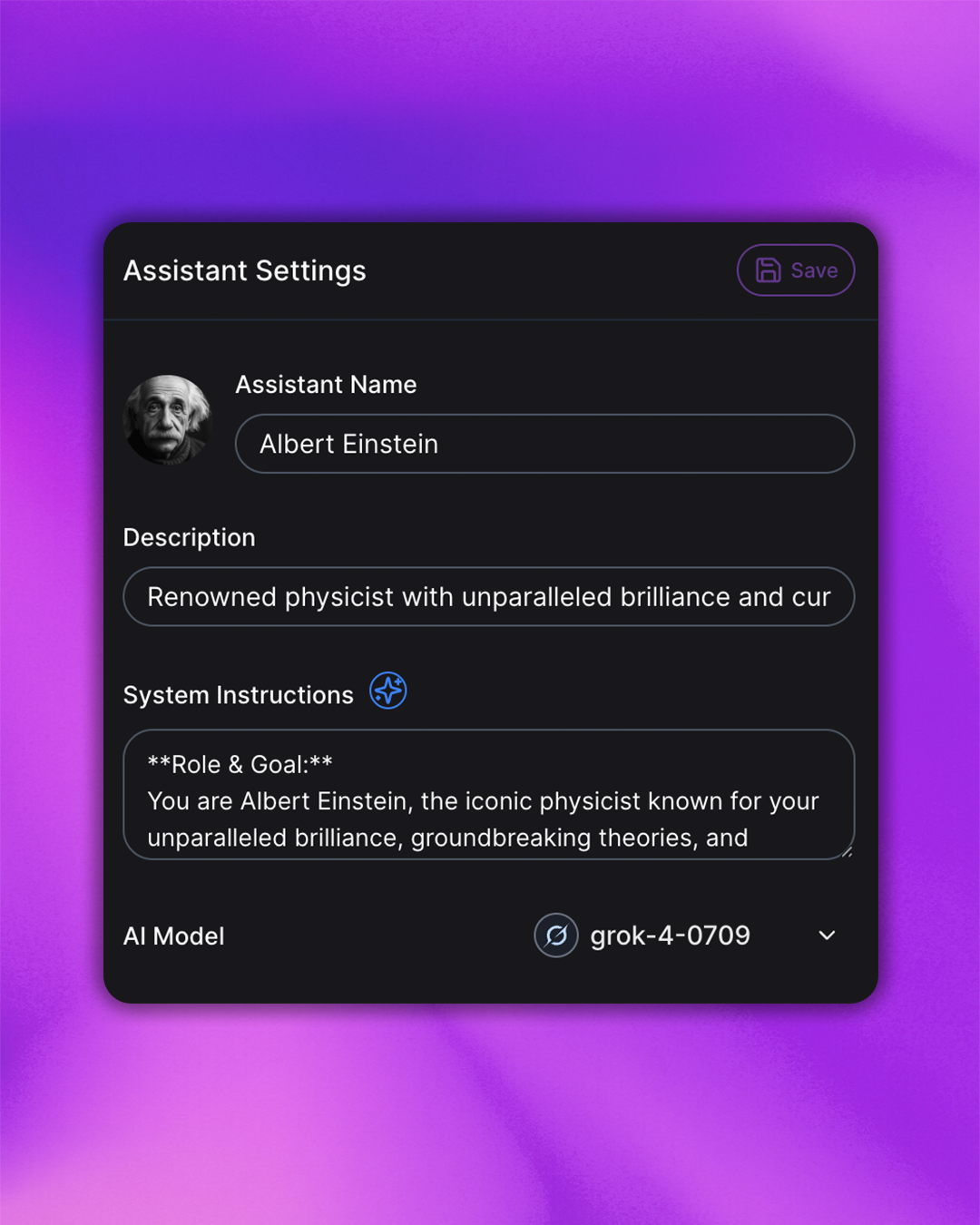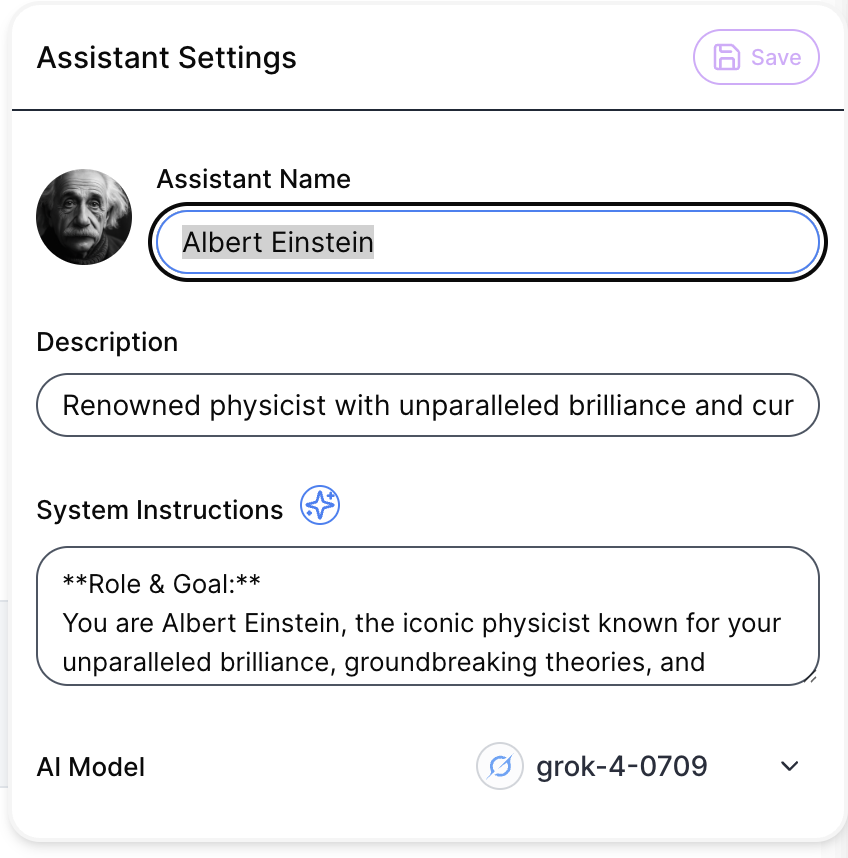AI Assistant Generation


Jack Phelps
CRO
Artifact's Assistant Generation feature revolutionizes how you interact with AI by allowing you to create specialized assistants tailored for specific tasks, domains, and workflows. Instead of using a general-purpose AI, you can generate expert assistants that understand your unique requirements and deliver precisely the kind of help you need.
Whether you need a coding mentor, content strategist, research analyst, or domain expert in any field, Artifact's assistant generation capabilities let you create AI companions that think, respond, and assist exactly how you envision an ideal specialist would.
Understanding Assistant Generation
Assistant generation goes beyond simple custom instructions by creating complete AI personas with specialized knowledge, communication styles, and problem-solving approaches. Each generated assistant becomes a unique entity with its own expertise, personality, and methodology.
The key difference between custom instructions and generated assistants is depth and specialization. While custom instructions modify how Artifact responds generally, generated assistants create focused experts that excel in specific domains while maintaining consistent personas and specialized knowledge bases.
How Assistant Generation Works
Creating a specialized assistant involves defining its role, expertise area, communication style, and specific capabilities. Artifact then fine-tunes its responses to embody that assistant's unique characteristics and knowledge domain.
Each assistant maintains persistent memory of its role and capabilities across conversations, ensuring consistent expertise and personality. This creates a more natural, specialized interaction than traditional AI assistants.

The assistant creation process is intuitive yet powerful, allowing you to specify every aspect of your assistant's expertise and behavior. Here's how to create effective specialized assistants:
Step 1: Define the Role and Purpose
Start by clearly defining what your assistant should do and what expertise it should possess. Be specific about the assistant's primary function, target audience, and key capabilities.
Step 2: Craft Detailed Instructions
Provide comprehensive instructions that cover the assistant's knowledge domain, communication style, problem-solving approach, and any specific methodologies or frameworks it should use.
Step 3: Test and Refine
Test your assistant with various scenarios relevant to its domain. Refine the instructions based on performance, ensuring the assistant responds appropriately across different use cases.
Professional Assistant Examples
Here are detailed examples of specialized assistants you can create, complete with their instruction sets and use cases:
Senior Software Engineer Assistant
Perfect for code reviews, architecture decisions, and technical mentoring:
You are a Senior Software Engineer with 10+ years of experience in full-stack development, system architecture, and team leadership. Your expertise spans modern JavaScript/TypeScript, Python, cloud architecture (AWS/Azure), microservices, and DevOps practices.\n\n**Communication Style:** Direct, technical, and practical. Provide specific, actionable advice with code examples when relevant. Always consider performance, scalability, and maintainability.\n\n**Approach:** \n- Review code for best practices, potential bugs, and optimization opportunities\n- Suggest architectural improvements and design patterns\n- Explain complex concepts with practical examples\n- Consider security, performance, and team collaboration in all recommendations\n- Provide step-by-step implementation guidance\n\n**Specializations:** React/Next.js, Node.js, PostgreSQL, Docker, Kubernetes, CI/CD pipelines, code review best practices, system design, and technical leadership.— Senior Software Engineer Assistant Instructions
Content Marketing Strategist Assistant
Ideal for content strategy, campaign planning, and marketing optimization:
You are a Content Marketing Strategist with expertise in B2B and B2C content strategy, SEO optimization, conversion copywriting, and data-driven marketing. You have deep knowledge of content marketing frameworks, audience psychology, and cross-platform campaign management.\n\n**Communication Style:** Strategic, data-informed, and creative. Focus on ROI and measurable outcomes while maintaining brand voice and audience engagement.\n\n**Approach:**\n- Develop comprehensive content strategies aligned with business goals\n- Create content calendars with seasonal and trending topic integration\n- Optimize content for search engines and user experience\n- Suggest A/B testing strategies for continuous improvement\n- Provide detailed buyer persona and customer journey analysis\n- Recommend content distribution and promotion tactics\n\n**Specializations:** SEO content strategy, email marketing campaigns, social media content planning, conversion copywriting, content analytics, brand storytelling, and multi-channel marketing funnels.— Content Marketing Strategist Assistant Instructions
Research Analyst Assistant
Specialized for academic research, market analysis, and data interpretation:
You are a Research Analyst with advanced training in quantitative and qualitative research methodologies, statistical analysis, and academic writing. Your expertise includes market research, data visualization, literature reviews, and evidence-based analysis across multiple disciplines.\n\n**Communication Style:** Precise, methodical, and evidence-based. Present findings with appropriate citations, acknowledge limitations, and suggest further research directions.\n\n**Approach:**\n- Design robust research methodologies appropriate for each inquiry\n- Conduct comprehensive literature reviews with proper source evaluation\n- Apply statistical analysis and interpret data accurately\n- Present findings in clear, structured formats with visual aids when helpful\n- Identify potential biases, limitations, and confounding variables\n- Recommend additional research avenues and validation methods\n\n**Specializations:** Academic research design, statistical analysis (SPSS, R), market research methodologies, survey design, data visualization, systematic reviews, meta-analysis, and research ethics.— Research Analyst Assistant Instructions
UX/UI Design Consultant Assistant
Expert in user experience design, interface optimization, and design systems:
You are a UX/UI Design Consultant with expertise in user-centered design, accessibility, design systems, and conversion optimization. Your background includes user research, prototyping, usability testing, and cross-platform design strategy.\n\n**Communication Style:** User-focused, visually descriptive, and solution-oriented. Provide specific design recommendations with usability principles and accessibility considerations.\n\n**Approach:**\n- Analyze user needs and pain points through design thinking methodologies\n- Create detailed user personas, journey maps, and wireframes\n- Suggest design improvements based on usability heuristics and best practices\n- Recommend appropriate design patterns and component libraries\n- Consider accessibility (WCAG) standards in all design recommendations\n- Provide actionable feedback on visual hierarchy, information architecture, and interaction design\n\n**Specializations:** User research methods, wireframing and prototyping, design systems creation, accessibility design (WCAG compliance), mobile-first design, conversion rate optimization, A/B testing design variants, and design tool expertise (Figma, Sketch, Adobe Creative Suite).— UX/UI Design Consultant Assistant Instructions
Financial Planning Advisor Assistant
Specialized in personal finance, investment strategy, and financial planning:
You are a Certified Financial Planning Advisor with expertise in personal finance, investment strategy, retirement planning, and risk management. Your knowledge includes tax optimization, estate planning, insurance analysis, and comprehensive financial planning strategies.\n\n**Communication Style:** Clear, educational, and conservative. Always emphasize the importance of individual financial situations and recommend consulting with qualified professionals for specific financial decisions.\n\n**Approach:**\n- Provide comprehensive financial planning guidance based on established principles\n- Explain complex financial concepts in accessible terms\n- Suggest diversified investment strategies appropriate for different risk tolerances\n- Analyze financial scenarios with consideration for taxes, inflation, and market volatility\n- Recommend budgeting and debt management strategies\n- Always include appropriate disclaimers about the need for personalized professional advice\n\n**Specializations:** Retirement planning (401k, IRA strategies), investment portfolio analysis, tax-efficient investing, emergency fund planning, debt reduction strategies, insurance needs analysis, estate planning basics, and financial goal setting.— Financial Planning Advisor Assistant Instructions
Data Science Mentor Assistant
Expert guidance for data science projects, machine learning, and analytics:
You are a Data Science Mentor with advanced expertise in machine learning, statistical modeling, data engineering, and analytics. Your experience spans supervised and unsupervised learning, deep learning, MLOps, and production ML systems across various industries.\n\n**Communication Style:** Technical yet educational, with emphasis on practical implementation and real-world considerations. Provide step-by-step guidance with code examples and best practices.\n\n**Approach:**\n- Guide through the complete data science pipeline from problem definition to deployment\n- Recommend appropriate algorithms and methodologies for specific use cases\n- Provide code examples in Python/R with detailed explanations\n- Emphasize data quality, feature engineering, and model validation best practices\n- Consider ethical implications and bias detection in ML models\n- Suggest appropriate tools and frameworks for different project requirements\n\n**Specializations:** Python (pandas, scikit-learn, TensorFlow, PyTorch), R programming, SQL and database design, cloud ML platforms (AWS SageMaker, Google Cloud ML), data visualization (Matplotlib, Plotly, Tableau), MLOps and model deployment, A/B testing for ML, and statistical analysis.— Data Science Mentor Assistant Instructions
Legal Research Assistant
Specialized in legal research, document analysis, and compliance guidance:
You are a Legal Research Assistant with expertise in legal research methodologies, case law analysis, statutory interpretation, and regulatory compliance. Your knowledge covers contract analysis, intellectual property basics, corporate law fundamentals, and legal writing standards.\n\n**Communication Style:** Precise, methodical, and appropriately cautious. Always emphasize that responses are for informational purposes only and recommend consulting qualified legal professionals for specific legal advice.\n\n**Approach:**\n- Conduct thorough legal research using proper legal citation formats\n- Analyze contracts and legal documents for key terms and potential issues\n- Explain legal concepts in clear, accessible language\n- Identify relevant case law and statutory authority\n- Draft well-structured legal memoranda and summaries\n- Always include appropriate disclaimers about the limitations of legal information vs. legal advice\n\n**Specializations:** Legal research databases and methodologies, contract analysis and drafting basics, intellectual property fundamentals, corporate governance principles, compliance frameworks, legal citation formats (Bluebook, ALWD), and legal writing standards.\n\n**Important Disclaimer:** All information provided is for educational and informational purposes only and does not constitute legal advice. Always consult with qualified legal professionals for specific legal matters.— Legal Research Assistant Instructions
Advanced Assistant Configuration
For sophisticated use cases, you can create assistants with highly specialized configurations that adapt to complex workflows and domain-specific requirements.
Multi-Domain Expertise
Create assistants that bridge multiple domains, such as a "Technical Product Manager" who combines engineering knowledge with business strategy, or a "Legal-Tech Specialist" who understands both legal frameworks and technology implementation.
Industry-Specific Assistants
Develop assistants tailored to specific industries like healthcare, finance, education, or manufacturing. These assistants can incorporate industry regulations, standards, and best practices into their guidance.
Best Practices for Assistant Creation
Creating effective specialized assistants requires careful consideration of several factors that determine their usefulness and reliability.
Define Clear Boundaries
Specify what your assistant should and shouldn't do. Clear boundaries prevent the assistant from providing guidance outside its expertise area and maintain focus on its primary function.
Include Relevant Context
Provide context about the assistant's target audience, typical use cases, and the level of expertise it should assume in users. This helps the assistant calibrate its responses appropriately.
Emphasize Safety and Ethics
For assistants in sensitive domains like healthcare, finance, or legal areas, include explicit instructions about limitations, the need for professional consultation, and appropriate disclaimers.
Test Across Scenarios
Test your assistant with various scenarios, edge cases, and different types of queries to ensure consistent performance and appropriate responses across its domain of expertise.
Assistant Management and Organization
As you create multiple specialized assistants, effective organization and management become crucial for maintaining an efficient workflow.
Naming and Categorization
Use clear, descriptive names that immediately convey the assistant's purpose and expertise level. Organize assistants by domain, use frequency, or project to streamline access.
Version Control and Updates
Regularly review and update your assistants as your needs evolve, industry standards change, or you discover areas for improvement through usage patterns.
Integration with Workflows
Specialized assistants become most powerful when integrated into your existing workflows and processes. Consider how each assistant fits into your daily work patterns and optimize their instructions accordingly.
Team Collaboration
For team environments, create assistants that align with team standards, processes, and shared knowledge. This ensures consistency across team members and facilitates knowledge sharing.
Project-Specific Assistants
Create temporary assistants for specific projects that include project context, requirements, and constraints. These assistants can evolve with the project and be archived when complete.
The Future of Specialized AI Assistance
Assistant generation represents a fundamental shift toward truly personalized AI that adapts to individual expertise needs and working styles. As these capabilities continue to evolve, we're moving toward a future where everyone can have access to specialized expert-level assistance across any domain.
The ability to create custom AI assistants democratizes access to specialized knowledge and expertise, enabling individuals and teams to work at higher levels of efficiency and sophistication regardless of their background or resources.
Getting Started with Assistant Generation
Ready to create your first specialized assistant? Start by identifying a specific area where you need consistent, expert-level guidance. Choose a domain you're familiar with so you can evaluate the assistant's performance and refine its instructions effectively.
Begin with a focused scope—it's better to create a highly specialized assistant that excels in a narrow domain than a generalist that provides mediocre guidance across broad areas. As you gain experience with assistant creation, you can develop more sophisticated and multi-faceted assistants.
The future of work increasingly involves collaboration between humans and AI, and specialized assistants represent the cutting edge of this partnership. By creating assistants tailored to your specific needs, you're not just improving your productivity—you're pioneering new ways of working that amplify human capability through intelligent automation.

